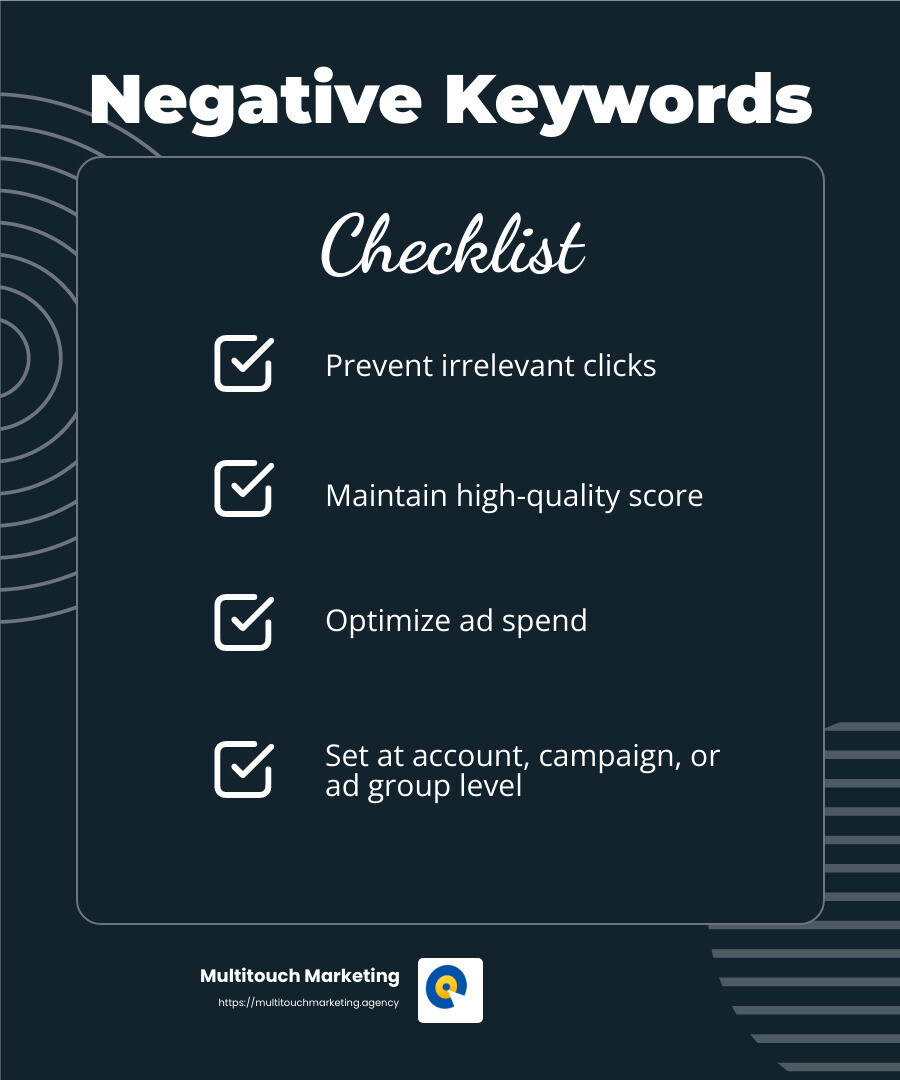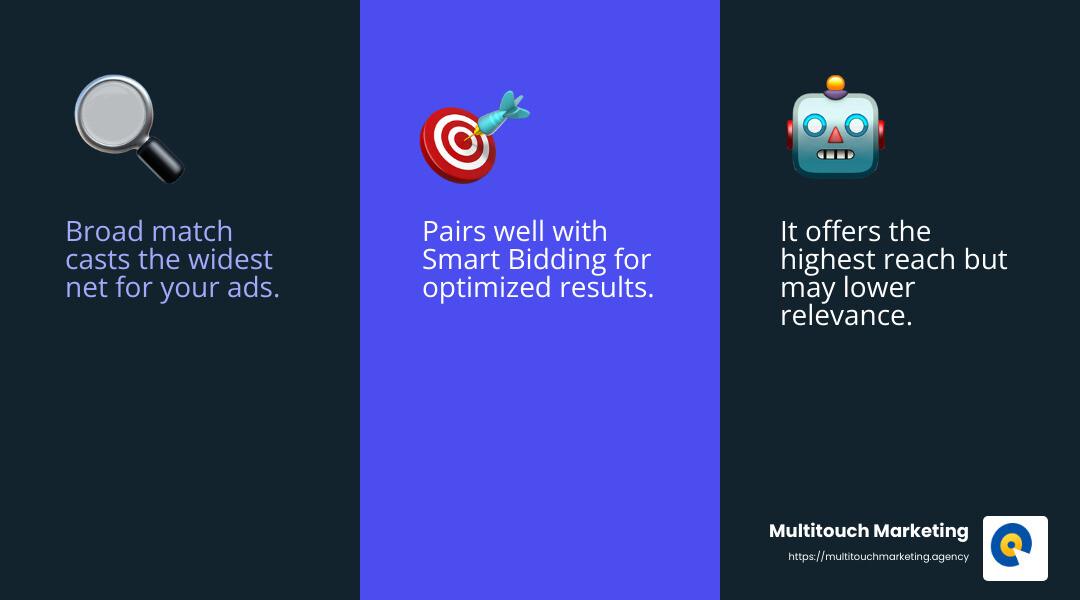PPC Keyword Match Types: 5 Essential Tips for Success
PPC keyword match types are pivotal in shaping how your digital ads reach potential customers. If you’ve ever wondered how your ad’s visibility can shift based on these match types, here’s a quick guide:
- Exact Match: Most precise, showing your ad only for search queries that closely match your keywords.
- Phrase Match: Allows your ad to appear in searches that include the exact phrase or a close variation.
- Broad Match: Casts the widest net, matching your ads to any relevant search query, offering diverse reach but less control.
These match types help you manage your budget and align your ads with users’ search intents, guiding where and when your ads appear.
I’m Milton Brown, with over a decade of experience in digital marketing, particularly in managing PPC keyword match types for various sectors. With a strong grasp on how these match types interplay with search queries, I strive to clarify their complexities for business owners.
Understanding PPC Keyword Match Types
In PPC advertising, keyword match types are your toolkit for controlling how your ads appear in search results. Let’s break down the four key types: broad match, phrase match, exact match, and negative keywords.
Broad Match
Broad match is your go-to for maximizing reach. It allows your ad to show up in any search query Google deems relevant, even if the exact words aren’t in the query. This can be a double-edged sword: while it offers the most exposure, it can also lead to irrelevant clicks.
For instance, if your keyword is “sneakers,” your ad might appear for “running shoes” or “sports footwear.” This flexibility is useful during early campaigns when you’re still gathering data on what works. However, keep an eye on your search term reports to ensure you’re not wasting budget on irrelevant traffic.
Phrase Match
Phrase match offers a balance between reach and relevance. Your ad will show up for searches containing your exact keyword phrase, but other words can appear before or after it. This means you can capture a wider audience while maintaining some control over the ad’s relevance.
For example, if your keyword is “leather boots,” your ad could appear for “buy leather boots online” or “best leather boots for winter.” This match type is ideal for advertisers who want to refine their audience without being too restrictive.
Exact Match
Exact match is all about precision. Your ads will only appear for search queries that closely match your keyword, including close variants like misspellings or plural forms. This type ensures the highest relevance but limits your reach.
Consider using exact match when you’re targeting high-converting keywords that you know are profitable. For instance, with the keyword [designer handbags], your ad will show for searches like “buy designer handbag” or “designer handbags on sale,” ensuring you’re reaching users with high intent.
Negative Keywords
Negative keywords are your shield against irrelevant clicks. By specifying words you don’t want your ad to appear for, you can prevent your ads from showing up in unrelated searches. This is crucial for maintaining a high-quality score and optimizing your ad spend.
For instance, if you sell premium products, you might add “cheap” as a negative keyword to avoid showing your ads to budget-conscious shoppers. Negative keywords can be set at the account, campaign, or ad group level, offering flexibility in your targeting strategy.
Understanding and utilizing these PPC keyword match types gives you the power to fine-tune your ad campaigns, ensuring they reach the right audience at the right time. By thoughtfully combining these match types, you can optimize your reach and relevance, ultimately driving better results for your business.
Broad Match: Maximizing Reach
Broad match is the match type that casts the widest net in PPC advertising. Think of it as a way to maximize your ad’s exposure by allowing it to appear in a wide array of search queries. This match type is great for advertisers looking to reach a large audience and gather valuable data on which search terms drive traffic.
Highest Reach, Lowest Relevance
When using broad match, your ads can show up for searches that don’t exactly match your keywords but are related. For example, a broad match keyword like “women’s hats” could trigger your ad for searches such as “winter headwear for women” or “ladies’ accessories.” This broad targeting can increase your reach significantly, but it may also lead to showing your ads to less relevant audiences.
Related Keywords and Smart Bidding
Broad match pairs well with Smart Bidding, Google’s automated bidding strategy. Smart Bidding uses machine learning to optimize bids for each auction, helping you reach more relevant queries and align with your performance goals. By combining broad match with Smart Bidding, you can let Google’s algorithms adjust your bids based on real-time signals like device, location, and time of day. This approach can help you maximize conversions or conversion value, even with a broader keyword scope.
However, broad match requires careful monitoring. Keep an eye on your search query reports to identify which terms are driving valuable traffic and which are not. Adding negative keywords can help refine your targeting and reduce irrelevant clicks.
In summary, broad match is a powerful tool for advertisers looking to expand their reach. It works best when paired with data-driven strategies like Smart Bidding to ensure that your ads are not just reaching more people, but the right people.
Phrase Match: Balancing Reach and Relevance
Phrase match is a middle-ground option in PPC keyword match types. It strikes a balance between reaching a broad audience and maintaining relevance to the searcher’s intent. This match type ensures that your ads appear when search queries include the meaning of your keyword, making it a smart choice for advertisers who want to connect with the right audience without casting too wide a net.
Medium Reach, Medium Relevance
With phrase match, your ads will show up for search queries that contain your keyword’s meaning. This means that while the words might not appear in the exact order, the intent behind the search aligns with your keyword. For instance, if your phrase match keyword is “interior paint,” your ad could display for searches like “buy interior paint” or “paint for living room.” However, it won’t show for unrelated searches like “lavender paint.”
Understanding Keyword Meaning
Phrase match is particularly effective for capturing search queries that reflect the user’s intent. Google’s AI takes into account the context and meaning of your keyword, ensuring that your ads are displayed to users who are genuinely interested in what you offer. This makes phrase match ideal for brand and competitor campaigns where maintaining relevance is crucial.
Search Queries and Optimization
Regularly reviewing your search query reports is essential when using phrase match. These reports will help you identify which queries are driving valuable traffic and which ones might be less relevant. By analyzing this data, you can refine your keyword list and add negative keywords to further improve your targeting.
Phrase match offers a solid compromise for advertisers seeking both reach and relevance. It allows you to engage with potential customers who are more likely to be interested in your products or services, while still keeping your ad spend efficient.
Exact Match: Ensuring Precision
When it comes to PPC keyword match types, exact match is the go-to option for advertisers prioritizing precision and relevance over reach. This match type ensures that your ads are triggered only when search queries closely align with your specified keywords, providing the highest level of control over who sees your ads.
Lowest Reach, Highest Relevance
Exact match keywords are like a finely tuned instrument, offering the highest relevance but the lowest reach. This means your ad will appear only for search queries that exactly match your keyword or are very close variants. For example, if your exact match keyword is [red bicycle], your ad might show for “red bike” or “red bicycles,” but not for queries like “buy bicycles” or “red mountain bike.”
By focusing on exact match, advertisers can ensure their ads are shown to the most relevant audience, minimizing wasted ad spend on irrelevant clicks.
Close Variants and Keyword Intent
While exact match provides precision, it still accommodates close variants to capture the user’s intent. Google’s algorithms allow for minor variations such as misspellings, singular or plural forms, and synonyms that don’t alter the intent. This means you can reach users who might type “bicycle” instead of “bike” without expanding your reach to unrelated searches.
Understanding Keyword Intent
The key advantage of exact match is its ability to align closely with user intent. Since the ads are shown only when the search query meaningfully matches the keyword, advertisers can expect higher conversion rates. This makes exact match ideal for targeting specific product names, unique selling propositions, or high-value keywords where precision is crucial.
Optimizing with Exact Match
To get the most out of exact match, regularly review performance data. Keep an eye on which exact match keywords are driving conversions and adjust your bids accordingly. Additionally, consider adding negative keywords to filter out any irrelevant traffic that might still slip through.
In summary, exact match is perfect for advertisers who want to maximize control and relevance, ensuring their ads are seen by the right audience with the right intent. By leveraging exact match, you can effectively manage your PPC campaigns to achieve higher quality leads and better ROI.
Negative Keywords: Excluding Irrelevant Searches
In PPC keyword match types, understanding negative keywords is just as important as choosing the right positive keywords. Negative keywords help you refine your campaigns by excluding search terms that aren’t relevant to your business, saving you money and improving your ad performance.
Negative Broad Match
Negative broad match is the most flexible type of negative keyword. When you use this match type, your ad won’t show if a search query contains all the negative keywords in any order. For example, if you add “chalkboard paint” as a negative broad match, your ad will not appear for searches like “buy chalkboard paint” or “chalkboard paint supplies.”
This match type is useful for filtering out a wide range of irrelevant searches without being too restrictive.
Negative Phrase Match
With negative phrase match, your ads won’t show if the search query contains the exact phrase of your negative keyword in the same order. For instance, using “chalkboard paint” as a negative phrase match will prevent your ad from showing up for queries like “cheap chalkboard paint” but not for “paint for chalkboards.”
This is a good middle ground, allowing you to exclude specific phrases while still capturing related searches that don’t include the exact phrase.
Negative Exact Match
Negative exact match is the most precise type of negative keyword. Here, your ad won’t appear only if the search query matches your negative keyword exactly. So, if “chalkboard paint” is your negative exact match, your ad will not be shown for that exact query but could still appear for “best chalkboard paint” or “chalkboard paint colors.”
This match type is ideal when you need to exclude a very specific term without affecting other related queries.
Strategic Use of Negative Keywords
Implementing negative keywords effectively can significantly improve your PPC campaign’s performance. By excluding irrelevant searches, you can focus your budget on more promising leads and improve your return on investment.
To make the most of negative keywords, regularly review your search query reports. Look for terms that are triggering your ads but aren’t converting, and add them as negatives. This ongoing process helps you refine your targeting and ensure that your ads are seen by the right audience.
By strategically using negative broad, phrase, and exact match types, you can fine-tune your campaigns to reduce wasted spend and improve ad relevance. This ensures that your ads are only shown to users who are likely to convert, maximizing the efficiency of your PPC efforts.
Next, let’s explore some of the frequently asked questions about PPC keyword match types and how they impact your campaign performance.
Frequently Asked Questions about PPC Keyword Match Types
What are the different types of keyword match types?
In the field of PPC keyword match types, there are four primary types to consider: broad match, phrase match, exact match, and negative match. Each serves a unique purpose and impacts how your ads are triggered in search results:
- Broad Match: This type offers the highest reach but lowest relevance. Your ad can appear for a wide range of searches related to your keyword, even if they don’t contain the exact terms. It’s great for finding new keywords but requires careful monitoring to avoid irrelevant clicks.
- Phrase Match: This match type balances reach and relevance. Your ad will show for searches that include the meaning of your keyword, maintaining the order of words. It’s useful for targeting specific phrases while allowing slight variations.
- Exact Match: The most precise option, exact match triggers your ad only when the search query closely matches your keyword. It ensures high relevance but limits reach. This type is ideal for targeting specific, high-performing keywords.
- Negative Match: Negative keywords prevent your ads from appearing for certain search terms. This helps exclude irrelevant traffic, refining your audience and improving ad performance.
How do match types affect PPC performance?
The choice of PPC keyword match types directly influences several key performance metrics:
- Reach: Broad match provides the most extensive reach, capturing a wide array of search queries. In contrast, exact match limits reach to very specific queries.
- Relevance: Exact match offers the highest relevance, ensuring your ad appears only for closely related searches. Broad match, while expansive, may result in less relevant impressions.
- Cost-Per-Click (CPC): The more targeted the match type (like exact match), the more efficient your spending can be, often resulting in a lower CPC. Broad match might lead to higher CPC due to less targeted clicks.
- Quality Score: Match types influence quality score by affecting ad relevance and click-through rates. Using the right match type can improve your quality score, potentially lowering your CPC.
Can I use multiple match types in one campaign?
Absolutely! Combining multiple PPC keyword match types within a single campaign can be a powerful strategy. This approach allows you to cover different stages of the customer journey and optimize your targeting strategy:
- Ad Groups: Organize your campaign into ad groups, each focusing on different match types. This helps you manage bids and monitor performance more effectively.
- Targeting Strategies: Use broad match for keyword findy and to increase reach. Employ phrase match to maintain relevance while still capturing variations. Rely on exact match for high-conversion keywords to maximize precision.
By leveraging multiple match types, you can ensure your ads appear in front of the right audience while controlling costs and enhancing relevance. This strategic approach allows you to adapt to changing search behaviors and continuously refine your campaigns for better results.
As you steer PPC, understanding these match types and their implications will empower you to make informed decisions and optimize your advertising efforts.
Conclusion
Navigating the complex world of PPC can be daunting, but with the right strategies and expert guidance, it becomes a powerful tool for growing your business. At Multitouch Marketing, we specialize in crafting effective PPC campaigns custom to your unique needs. Our expertise in PPC keyword match types ensures that your ads reach the right audience, maximizing both reach and relevance.
Why Choose Multitouch Marketing?
We understand that every business is different, and so are its marketing needs. Our team of experts is dedicated to helping you achieve your advertising goals through comprehensive PPC strategies. We focus on:
- Customized Campaigns: We design PPC campaigns that align with your business objectives, ensuring optimal performance and return on investment.
- Expert Guidance: Our team stays updated with the latest trends and best practices in PPC advertising, providing you with the insights needed to steer this dynamic landscape.
- Continuous Optimization: We don’t just set up your campaigns and leave them. We continuously monitor and refine them to ensure they deliver the best possible results.
Whether you’re looking to increase brand awareness or drive more sales, our custom PPC solutions can help you achieve your goals. By understanding and utilizing the different PPC keyword match types, we ensure your ads are seen by the right people at the right time.
Ready to improve your PPC campaigns and drive success? Contact us today to learn more about how Multitouch Marketing can help your business thrive.



